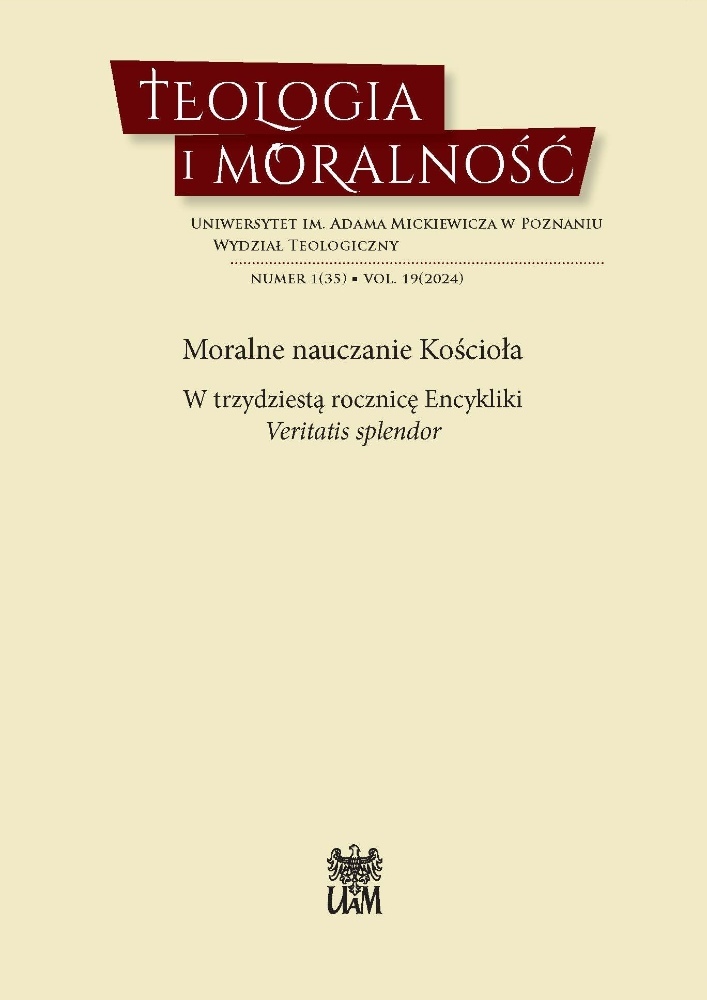Abstract
This paper aims to show why and how the dynamic development of artificial intelligence can and should be of interest to theological disciplines. First, the author argues that technological artefacts that are part of the culture can be considered as new “sites” of human beings and, thus, theological sites. Reflecting on the algorithms created to mimic and replace intelligent human action leads to asking questions about the nature of man, his functioning and purpose. The author analyzes how this resonates with contemporary tasks and methods of theology. Next, the author examines the context of defining artificial intelligence and points out its implications. In the paper’s final part, the author analyzes how ethics, including ethics practised on the basis of theology, can contribute to shaping the development of artificial intelligence. The overall argument leads to the conclusion that theology, thanks to its unique perspective, can play a significant and positive role in the context of the phenomenon of artificial intelligence. This opens up new and creative opportunities for the theological disciplines to serve faith and culture.
References
AlgorthmWatch. 2020. Dostęp: 05.09.2023. https://inventory.algorithmwatch.org.
Benanti, Paolo. 2016. Homo Faber. The Techno-Human Condition. Bolonia: EDB.
Benanti, Paolo. 2019. “Artificial Intelligences, Robots, Bio-engineering and Cyborgs: New Challenges for Theology?” Concilium (00105236), Issue 3: 34-47.
Benanti, Paolo. 2021. La grande invenzione. Il linguaggio come tecnologia, dalle pitture rupestri al GPT-3. San Paolo Edizioni.
Benanti, Paolo. 2023. “The urgency of an algorethics.” Discover Artifi cial Intelligence, 3: 11. Springer. DOI: https://doi.org/10.1007/s44163-023-00056-6
Benasayag, Miguel. 2019. Funzionare o esistere? Vita e Pensiero.
Bringsjord, Selmer, Paul Bello and David Ferrucci. 2001. “Creativity, the Turing Test, and the (Better) Lovelace Test.” In: Minds and Machines, 11: 3-27.
Churchil, Winston. 1943. Cytowany w: Volchenkov, Dimitri. 2018. „Grammar of Complexity: From Mathematics to a Sustainable World,World Scientific Publishing Company”.
Crawford, Kate. 2021. Atlas of AI: Power, Politics, and the Planetary Costs of Artificial Intelligence. Yale University Press. New Heaven and London. DOI: https://doi.org/10.12987/9780300252392
Crook, Nigel and Corneli. 2021. “The Anatomy of moral agency: A theological and neuroscience inspired model of virtue ethics.” Cognitive Computation and Systems, Volume 3, Issue 2: 109-122. DOI: https://doi.org/10.1049/ccs2.12024
Dastin, Jeff rey. 2018. Amazon scraps secret AI recruiting tool that showed bias against women.Dostęp: 05.09.2023. https://www.reuters.com/article/us-amazon-com-jobs-automation-insight-idUSKCN1MK08G.
Dignum, Virginia. 2019. Responsible Artificial Intelligence: How to Develop and Use AI in a Responsible Way. Springer Nature Switzerland. DOI: https://doi.org/10.1007/978-3-030-30371-6
Dzidek, Tadeusz i Piotr Sikora. 2018. „Metody”. W: Poznanie teologiczne, red. T. Dzidek, Ł. Kamykowski i A. Napiorkowski, 151–174 (Teologia Fundamentalna, 5). Krakow: Uniwersytet Papieski Jana Pawła II w Krakowie. Wydawnictwo Naukowe. DOI: https://doi.org/10.15633/9788374387262.06
Dreyfus, Hubert. 1992. What Computers Can’t Do: The Limits of Artificial Intelligence. The MIT Press.
Encyklopedia PWN. Sztuczna inteligencja. Dostęp: 05.09.2023. https://encyklopedia.pwn.pl/haslo/sztuczna-inteligencja;3983490.html.
Floridi, Luciano. 2007. “A Look into the Future Impact of ICT on Our Lives.” In: The Information Society, Volume 23: 59-64.
Floridi, Luciano. 2023. The Ethics of Artificial Intelligence: Principles, Challenges, and Opportunities. OUP Oxford. DOI: https://doi.org/10.1093/oso/9780198883098.001.0001
Franciszek. 2017. Konstytucja Apostolska „Veritatis gaudium” o uniwersytetach i wydziałach kościelnych.
Lemoine, Blake 2022. Scientific Data and Religious Opinions. Dostęp: 05.09.2023. https://cajundiscordian.medium.com/scientific-data-and-religious-opinions-ff 9b0938fc10.
Marks, Robert J. 2022. Non-Computable You: What You Do That Artificial Intelligence Never Will. Discovery Institute Press.
OpenAI. 2023. „About”. Dostęp: 05.09.2023. https://openai.com/about.
Puzio, Anna. 2023. “Theology Meets AI: Examining Perspectives, Tasks, and Theses on the Intersection of Technology and Religion.” In: Alexa, wie hast du’s mit der Religion? Theologische Zugange zu Technik und Kunstlicher Intelligenz Theologie und Kunstliche Intelligenz, Vol. 1. Darmstadt: wbg Academic.
Rome Call for AI Ethics. 2020. Dostęp: 05.09.2023. https://www.romecall.org/the-call/.
Schneider, Susan. 2019. Artificial you: AI and the future of your mind. Princeton University Press. New Jersey & Oxfordshire. DOI: https://doi.org/10.1515/9780691197777
Stachewicz, Krzysztof. 2020. „Karol Wojtyła’s philosophy of freedom”. Teologia i Moralność, 15(2020), nr 1(27). DOI: https://doi.org/10.14746/tim.2020.27.1.10
Turing, Alan. 1950. “Computing Machinery and Intelligence.” Mind, vol. LIX, no. 236.
Wynsberghe van, Aimee and Robbins Scott. 2018. “Critiquing the Reasons for Making Artificial Moral Agents.” Sci Eng Ethics, 25(2019): 719-735.
Zatwardnicki, Sławomir. 2018. „Wizja teologii w wypowiedziach papieża Franciszka”. Rocznik Teologii Katolickiej, t. XVII, 3: 237-257.
Zhang, Daniel et al. 2021. The AI Index 2021 Annual Report, AI Index Steering Committee, Human-Centered AI Institute, Stanford University, Stanford.
License
Copyright (c) 2024 Maciej Mróz

This work is licensed under a Creative Commons Attribution 4.0 International License.

